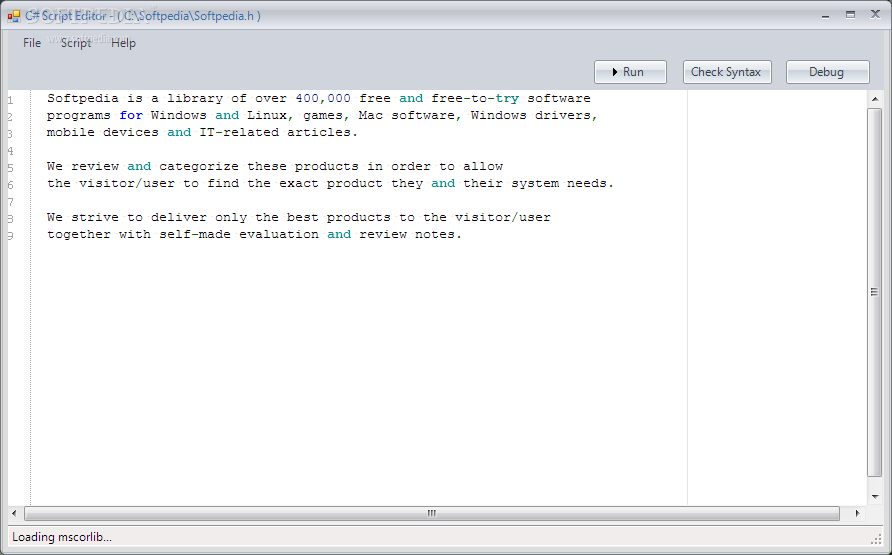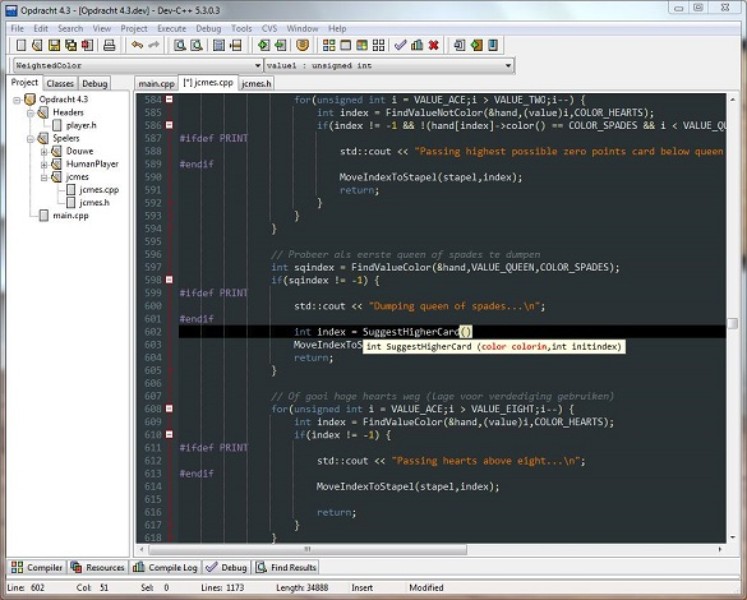When writing a code in C language, compiling it will be the most important step as the code can be run only after that. There are many C compilers for windows 7 64-bit available that can be used for this purpose. C compiler for windows 8 can be used on the Windows 8 platform and works the same way as any C compiler for windows free download. These GCC compiler for windows are free to use and can be downloaded very easily.
Related:
Dev-C++
- The Arm GNU Toolchain is also available as part of Atmel Studio. Only those users who wish to run the Arm GNU Toolchain as standalone tools from the command line need to download and install this package. C/C cross compiler; Assembler and linker; C-libraries for developing C/C programs.
- TryC is C compiler for Mac computers and beginners. Using TryC, you can develop, compile, and execute a C, C and Ruby program just like text editor. Once you have completed developing your code, TryC will help you to compile and run it with just a for a few seconds. D is a general purpose systems and applications programming language.
- The GNU Compiler Collection or GCC for short, comprises front ends for C, Objective-C, C, Java, Fortran, Go and Ada, along with libraries for the mentioned languages. GCC us the main component of the GNU toolchain, it is distributed under the GNU General Public License and plays a central.
This software can be used for free on the Windows platform to compile the code. Code insight can be obtained and it has many editable shortcuts. GPROF profiling can be done and GDB debugging is possible. It has many external tools and the syntax used in the code can be highlighted.
MinGW
This free software is open source and can be used for development of the native MS Windows applications. The compilers will provide access to the Microsoft C runtime and certain language specific. It will be able to compile C, C++, ADA and Fortran codes.
Download GCC for free. GCC - The GNU Compiler Collection includes front ends for C, C, Objective-C, Fortran, Java, Ada, and Go, as well as libraries for these languages (libstdc, libgcj.
Turbo C++
This freeware can be used to compile the C++ codes. The software can be opened and the full screen can be selected. The code that has to be run can be typed into the blue screen that appears on the interface. The syntax that is used in the code will be highlighted and new projects can be opened. It is possible to edit existing projects.
Lcc-win
This software can be used for free as a C compiler system. The software has a code generator that has a compiler, resource compiler, librarian, linker, and assembler. The integrated development environment can be used for editing and debugging.
Bloodshed
This freeware can be used on the Windows platform as an integrated development environment that can be used for C and C++ programming languages. It will be able to support GCC based compilers and integrated debugging is possible. The syntax highlighting can be customized by using the editor.
Digital Mars
This freeware can be used for C and C++ compiling. Add-on libraries can be used for 16-bit DOS development and 32-bit DOS development. The compiler will be able to support different formats and the process is done very fast. Integrated development can be used for debugging.
C++ compilers
This freeware can be used as a C++ compiler that follows the ISO standard. The compilers are embedded in the framework of the development tools and libraries. It can be used for various purposes and all the necessary tools can be found in one place. The software can be downloaded for free.
Pelles C – Most Popular Software
This software can be used for free and many features like C compiler, macro assembler, message compiler and code signing utility can be used. It will be able to support 32-bit and 64-bit Windows and it is very popular for different C standards like C99 and C11.
How to Install C Compiler for Windows?
Most of the C compilers that are available online can be downloaded for free. The software that will fit all the requirements has to be selected and the download link can be used to download the file. If any previous versions are installed on the computer, then that has to be uninstalled. The zip file has to be extracted and the setup.exe file should be run so that the software can be installed onto any desired location. You can also see Debugging Software
The instructions that are prompted on the installation window should be followed.This software can be used for various functions like integrated sampling profiles, source level debugging, source code editing, bitmap, icon and cursor editing and much more. Custom controls can be used for the digital editor and it will be able to support project wizard.
Related Posts

Installing G++ on a Mac
This section is intended to get you quickly started with C++ programming on your Mac. We'll be installing GCC 4.8.1 and GDB through a tool called Homebrew. If you want an additional guide on all of the following steps (except for installing GCC), the one by Moncef Belyamani is quite helpful. When you follow it, ignore anything about installing Ruby; that is, stop after setting up git.
Homebrew
Homebrew 'installs the stuff that you need that Apple don't'. It's like Ubuntu's apt-get, where one can install packages easily from repositories. Instead of having to download, configure, and install something yourself, all you need to do is run one command, and Homebrew will take care of the rest for you.
Pre-requisites
Homebrew requires that you have either Xcode or the Xcode command line tools installed on your Mac. Xcode is a free integrated development environment similar to Eclipse designed by Apple and mainly intended for iOS development or targeting the clang compiler. In this class, we will focus on gcc.
Xcode is quite a big install, so if you do not want to install it, you can get away with just installing the Xcode command line tools. See a Stackoverflow discussion for instructions on how to install the command line tools regardless of whether you have Xcode installed.
Installing Homebrew
You need xcode command line tools to install Homebrew. It is very easy to install Homebrew. Open your terminal, and run the following command:
If this doesn't seem to do anything, try killing it (CTRL C) and running it again. Or checkout homebrew website.
GCC and GDB
Installing GCC
First of all, you should make sure that your Homebrew is up-to-date. Check to see if it is so with the following:

As mentioned before, installing packages with Homebrew is very easy. First, we will add the repository from which the GCC package is available, so that Homebrew knows where to find the package we want. The repository is at https://github.com/Homebrew/homebrew-versions.
We do this by using the brew-tap command. Keep your terminal open, and run the following command. (For more information on how brew-tap works, visit the Homebrew docs):
Next, we will actually install the GCC package. Run the following command:
It might take long time before the installation is complete. If you run into any issues, you can debug with:
When done, run the following:
The result should look like this:
Gnu C Compiler Mac Download Free
USC Wireless Warning
Many people have had issues running the brew install commands while connected to USC Wireless. If you are having trouble, you can either try using a wired connection, a different wireless connection, or do the following:
- Download a homebrew cache
- Open Finder, press CMD (command) + SHIFT + G and type
/Library/Caches/Homebrew Extract the contents of the .zip you downloaded inside of the folder you opened in the previous step. Do not extract any of the .tar.bz2 or .tar.gz inside of the .zip folder.This should look as follows:
Run
brew install gcc48in the Terminal as instructed above.
Using G++
To compile with the newly installed G++ compiler, use g++-4.8.

(Advanced) Aliasing g++
If you prefer calling g++ directly, you can also create a bash alias, as follows:
Put these two lines at the end of the file ~/.bashrc, and run:source ~/.bashrc

For more information on bash alias, take a look at the GNU Docs.
Installing GDB
Here also we use Homebrew. The following instruction has been taken from GDB on OS X Mavericks and Xcode 5 guide. To install, run the following brew command.
Check if it's installed:
Download Gnu Gcc C++ Compiler
The result should be gdb version 7 or higher.
Gcc Compiler Download
Codesigning gdb
Gnu Compiler Download Windows 10
gdb is not going to debug yet. You'll get an error message like 'please check gdb is codesigned'. You need to create a certificate and sign gdb. By doing so you're telling the operating system that gdb is authorized to attach to other processes for debugging purposes. The following instructions have been taken from this Code Signing guide.
Gnu C Compiler Mac Download Windows 10
- Open application 'Keychain Access' (/Applications/Utilities/Keychain Access.app)
In Keychain Access, select the 'login' keychain in the 'Keychains' list in the upper left hand corner of the window.
Open the menu item in /Keychain Access/Certificate Assistant/Create a Certificate...
Choose a name ('lldb_codesign' in the example, but you can use anything you want), set 'Identity Type' to 'Self Signed Root', and set 'Certificate Type' to 'Code Signing'. Click 'Create'.
Click continue, continue and done.
Click on the “My Certificates” category on the left side and double click on the new “lldb_codesign” certificate.
Open the context menu for 'Trust' (click the triangle) and change the following:
When using this certificate: Always TrustNow close this window, and enter your login password to confirm this change.
Option-drag (this meaning holding the option key down and dragging) the new 'lldb_codesign' certificate from the login keychain to the System keychain in the Keychains pane of the main Keychain Access window to make a copy of this certificate in the System keychain. You'll have to authorize a few more times, set it to be 'Always trusted' when asked.
Switch to the 'System' keychain and drag a copy of the 'lldb_codesign' you just made onto the Desktop.
Switch to Terminal and then run the following command (copy paste it!):
sudo security add-trust -d -r trustRoot -p basic -p codeSign -k /Library/Keychains/System.keychain ~/Desktop/lldb_codesign.cerThen right click on the 'lldb_codesign' certificate in the 'System' keychain (not 'Login') and select 'delete' to delete it from the 'System' keychain.
Then reboot your system/computer.
Finally you can sign gdb:
codesign -s lldb_codesign /usr/local/bin/gdbIf this command doesn't work...then panic! Just kidding, be sure that you have gdb installed and that gdb is actually installed in /usr/local/bin. You may want to try 'which gdb' in your Terminal to figure out where it is.
Finally, remove the lldb_codesign.cer file that's sitting on your desktop, and gdb should be working at this point. :)